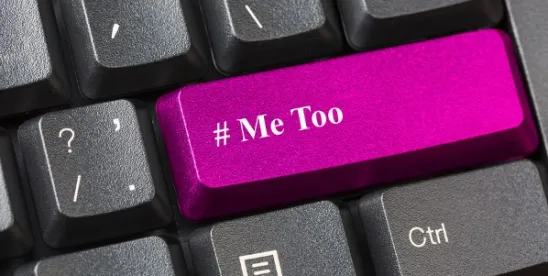This Employment Law This Week Deep Dive episode focuses on preventing harassment in the #MeToo era. The #MeToo movement has raised the stakes for all employers.
Attorneys discuss what the #MeToo movement has taught us; the active role being taken by state and local governments to regulate the working environment, including requirements that mandate anti-harassment training for employees; and guidance on workplace harassment that was recently issued by the U.S. Equal Employment Opportunity Commission.
Read on for more about this week's episode, or watch the video below:
1. Preventing Harassment in the #MeToo Era
The #MeToo and Time’s Up movements have resulted in blockbuster allegations against titans of media, entertainment, and politics, but they have also raised the stakes for all employers. In this edition of Employment Law This Week, we look at preventing harassment in the #MeToo era.
What has #MeToo taught us? We asked Jennifer Gefsky, from Epstein Becker Green:
“I think if the #MeToo movement taught us one thing, it's that employers face significant liability and risk in the event that allegations are made against any employee or supervisor or the highest-level executive at the company. And sometimes those claims are insurmountable for a company, and they don't survive. Now, that case is rare, but it certainly has happened. But even in the case where the company does survive, it can do significant damage, not just in terms of money but in terms of reputation. And, in that way, it makes it very difficult for companies to hire new talent and to create that great culture that every company wants.”
2. Regulation on the Rise
State and local governments have been taking a much more active role in regulating the working environment, requiring transparency from employers and the infrastructure necessary to handle complaints. Ian Carleton Schaefer, from Epstein Becker Green, gives us an overview of recent legislation:
“We're seeing states and cities enacting and promulgating model anti-harassment policies, model anti-sexual harassment trainings. We’re seeing a prohibition against non-disclosure agreements, both before the employment relationship begins or the outset of the employment relationship, as well as in settlement agreements, prohibition against confidentiality for sexual harassment complaints, unless it's the choice of the plaintiff or the aggrieved employee. We're seeing required training, like in New York State and New York City, that requires employers to conduct annual anti-harassment training for all of its employees, whether you have worked there for one day or for 10 years.”
New York City now has the most robust anti-harassment and anti-discrimination protections in the country, with new laws going into effect from the city and the state in October 2018 and early 2019, respectively. The lynchpin of the NYC model is mandatory training. All employers are now required to provide annual anti-harassment training to every employee and even independent contractors. The training must meet or exceed the “model training” that the state has provided.
For more, click here: https://www.hrdive.com/news/metoo-leads-to-training-mandates-and-more/531636/
Jennifer Gefsky provides more:
“All employees in a company should understand the company’s policies on harassment and discrimination, and they should know what to do in the event they see something, hear something, or something is happening to them. Who do they go to, who do they report to? And then what they can expect to happen in the event they make a complaint.”
Ian Carleton Schaefer:
“I think you're seeing a trend, if you need to look forward in terms of what's happening, what's going to happen in the future, what can we anticipate. I think if you look at what's happening in New York State and New York City, that's going to be the model for what happens throughout the country.”
For more, click here
3. EEOC Guidance on Workplace Harassment
Along with training, employers and regulators are looking at cultural and institutional issues within an organization. On a federal level, the Equal Employment Opportunity Commission (EEOC) has issued guidance calling for this approach. Here’s Ian Carleton Schaefer:
“The EEOC takes the position that we need a holistic approach to dealing with issues of harassment and discrimination in the workplace. And that goes beyond just policies and training, and it goes towards leadership, toward accountability, toward the organization's culture and how these issues are raised, how they're surfaced, how they're dealt with. And also, programming that takes place in the organization around diversity, around inclusion. And really this holistic, universal, global approach to dealing with and creating workplaces that are diverse, inclusive, and respectful for everybody that comes into contact with the employer.”
Both the training being mandated in New York and the cultural approach that the EEOC advocates are measures that experts say can significantly decrease a company’s exposure to risk. Jennifer Gefsky has more:
“Sexual harassment allegations can have a huge impact on a company. First, financially, they're very expensive claims to litigate, to defend, but they can also have a huge impact on a company's culture, both internally and then also what the public perceives a company to be. And those are very difficult for a company to overcome. Companies have to work on their culture. They have to create an environment in which employees feel comfortable saying when they're uncomfortable. And if an employer can create that culture, they're going to mitigate so many of the claims that could potentially take place in their workforce.”




 />i
/>i

